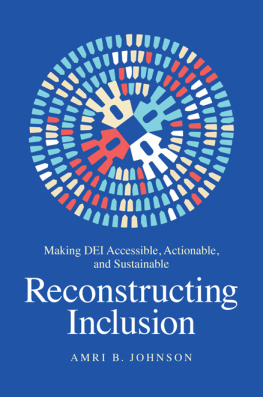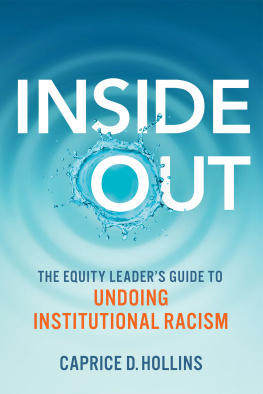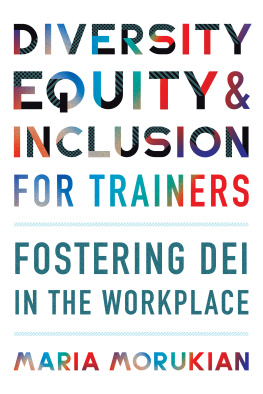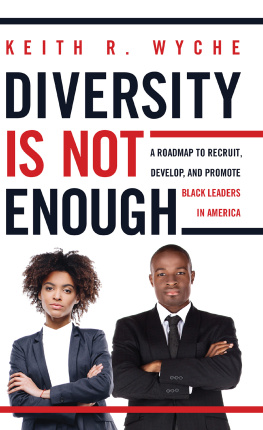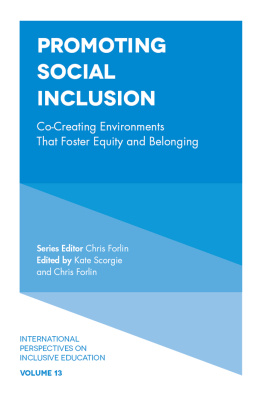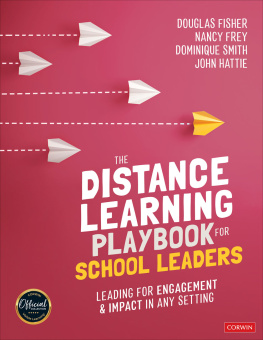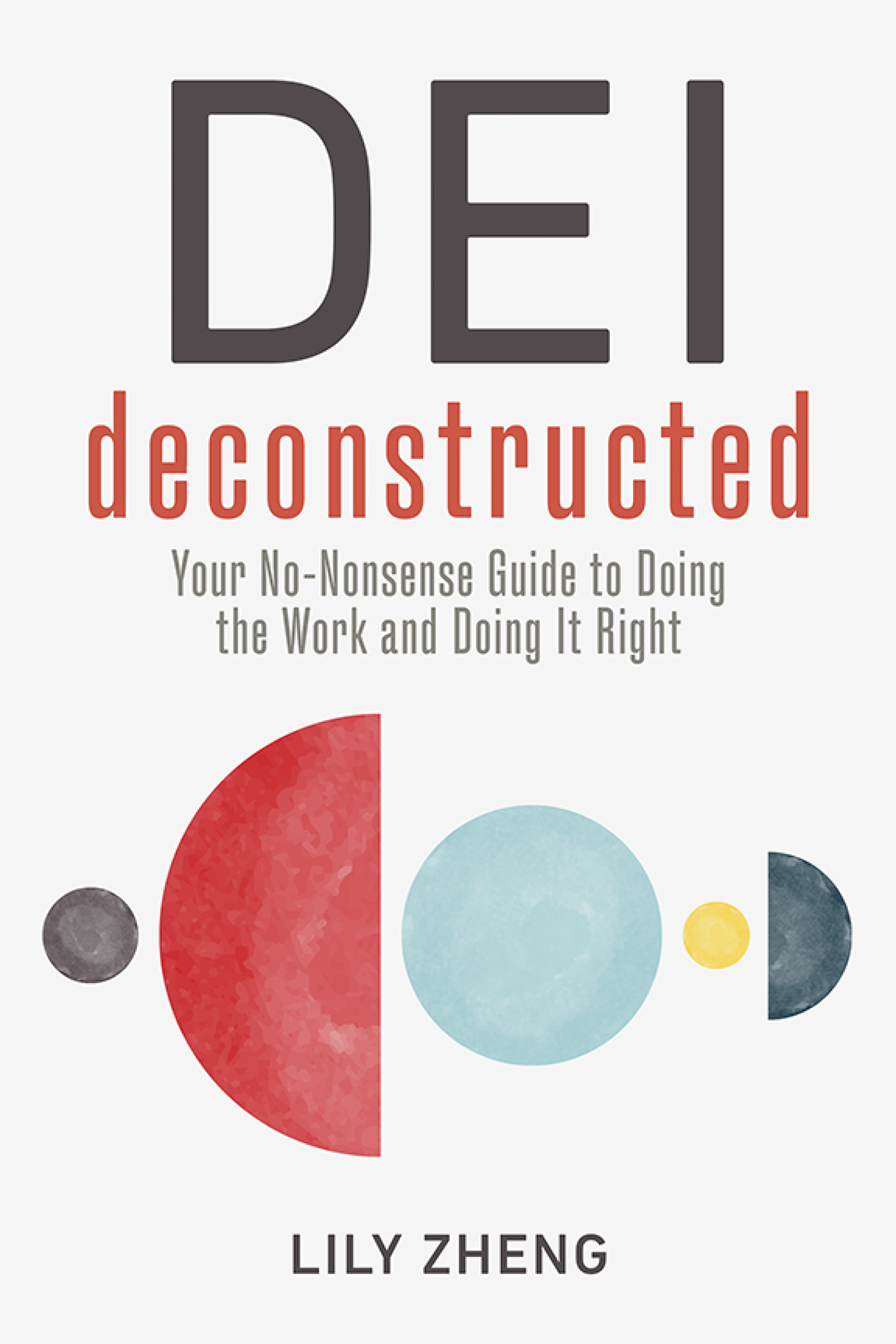Contents
Guide
DEI
deconstructed
DEI
deconstructed
YOUR NO-NONSENSE GUIDE TO DOING THE WORK AND DOING IT RIGHT
LILY ZHENG

DEI Deconstructed
Copyright 2023 by Lily Zheng
All rights reserved. No part of this publication may be reproduced, distributed, or transmitted in any form or by any means, including photocopying, recording, or other electronic or mechanical methods, without the prior written permission of the publisher, except in the case of brief quotations embodied in critical reviews and certain other noncommercial uses permitted by copyright law. For permission requests, write to the publisher, addressed Attention: Permissions Coordinator, at the address below.

| Berrett-Koehler Publishers, Inc.
1333 Broadway, Suite 1000
Oakland, CA 94612-1921
Tel: (510) 817-2277, Fax: (510) 817-2278
www.bkconnection.com |
Ordering information for print editions
Quantity sales. Special discounts are available on quantity purchases by corporations, associations, and others. For details, contact the Special Sales Department at the Berrett-Koehler address above.
Individual sales. Berrett-Koehler publications are available through most bookstores. They can also be ordered directly from Berrett-Koehler: Tel: (800) 929-2929; Fax: (802) 864-7626; www.bkconnection.com
Orders for college textbook/course adoption use. Please contact Berrett-Koehler: Tel: (800) 929-2929; Fax: (802) 864-7626.
Distributed to the U.S. trade and internationally by Penguin Random House Publisher Services.
Berrett-Koehler and the BK logo are registered trademarks of Berrett-Koehler Publishers, Inc.
First Edition
Hardcover print edition ISBN 978-1-5230-0277-1
PDF e-book ISBN 978-1-5230-0278-8
IDPF e-book ISBN 978-1-5230-0279-5
Digital audio ISBN 978-1-5230-0280-1
2022-1
Book production: David Peattie / BookMatters
Cover design: Frances Baca
To everyone striving toward a better,
more inclusive, more equitable world.
You are powerful. You are enough.
You are your ancestors dreams made real.
CONTENTS
PREFACE
$15,000 for a talk, huh?
The corporate vice president I was speaking to nodded. If that works for you.
I studied his slightly pixelated face in the Zoom window and then spoke again. You know, as much as I believe in the talks I give, theres only so much I can do in sixty minutes... even if the audience for this conference is as big as you say.
Are you saying youre not interested in the opportunity?
Not exactlyjust that $15,000 of work gets you quite a bit if we put it toward other things. We could run a survey, for starters, and several interviews. We could analyze that data to get at least a basic sense of the state of DEI in your company and the things you and your leadership team could address to make progress. I can tell you that doing this would make far more impact than a single talk could. Itd create more lasting value, too.
His demeanor shifted. Well, ahIm not sure we have the budget for... its not exactly in the, ah, scope of what I was planning to talk to you about today. Im sure, Im sure I could connect you to a colleague of mine that might be interested in talking about other ways to partner afterward. For now, lets focus on this talk. Does the offer work for you?
I hesitated for a moment, but only a moment. Sure. $15,000 for the sixty-minute talk. How could I say no?
A month later, I delivered the talk over Zoom, and a month after that, I received my check. I never heard from the VP or his colleague again. I didnt follow up.
In the summer of 2020, as protests erupted across the United States and around the world following George Floyds murder, my website contact form was flooded by inquiries. The subject lines were all uncannily similar. Help us process our emotions in a workshop. Help us discuss this tough issue in a listening session. Help us say the right thing on social media. Help us do something about diversity in our own organization with an unconscious bias training.
The magnitude of the demand was on a scale larger than anything I had seen in my career as a diversity, equity, and inclusion (DEI) consultant, but at the same time, something was off. Maybe it was the panicked surprise evident in many of the messages. Maybe it was the blatant desire to solve enormous problems in a single session. Maybe it was the laughably meager budgets that decision-makers were allocating to address their employees racial justice concerns (one lead, who for their own sake I wont name, offered $200).
I sent most contacts the same question in response. Before I meet with you, what exactly are you hoping happens after I provide these services?
While I waited for responses, the news cycle moved swiftly. One day, the hashtag #BlackoutTuesday went viral on social media. Millions of users, large companies among them, began to post black squares on social media in solidarity with the Black Lives Matter movement only to take them down that same afternoon as frustration and disapproval mounted from Black community members and organizers who opposed the tactic. Companies posted #BlackLivesMatter hashtags on their social media accounts and made showy pledges to donate vast sums of money toward supplier diversity, diversifying their workforce, and NGOs like the American Civil Liberties Union. But few provided means to ensure any accountable follow-through of these commitments.
And, of course, companies frantically searched far and wide for DEI consultants and facilitators to deliver unconscious bias training to their workforce, It was like a tsunamithe tide went out from under our feet, only to surge back with such ferocity that we were left drowning in the demand for DEI work.
Each time I retell this story, I get the same eager questions. Was there a happy ending? Did companies finally recognize the value of diversity, equity, and inclusion work and enable the many experts, practitioners, educators, and consultants to work their magic? Did a new cohort of companies triumphantly emerge from 2020, having turned over a new leaf, as a new vanguard of the diverse, equitable, and inclusion organizations of the future?
Well, no. Unfortunately, none of that happened. What happened is that an industry whose sole job it was to make a difference, that had fought for years for a seat at the table, was catapulted into the spotlight more suddenly than anyone could have predicted. After a year of our efforts, what we have to show for it is... inconclusive, at best. Systemic inequity is still alive and well. Organizations worldwide still struggle with representation on multiple dimensions, from race and gender to age, class, sexuality, religion, and more. As societies, we still face the same enormous challenges we faced in 2019 and have faced for decades and centuries.
Diversity, equity, and inclusion, however, are undeniably in vogue. More companies than ever have turned to the industry, asking for professional help. More new and aspiring practitioners have jumped into the industry seeking experience, knowledge, or even just a piece of the very lucrative pie. Yet, despite this scramble, Ive noticed an increasing undercurrent of concern coming from the people whose job it is to lead or even just exist in the workplaces DEI practitioners sell to and opine on.


